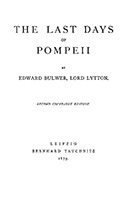The Last Days of Pompeii
“He said he had all Sir Walter Scott's works and all Lord Lytton's works at home and never tired of reading them. Of course, he said, there were some of Lord Lytton's works which boys couldn't read.”
-“An Encounter” (D 25)
Lytton’s writings were popular throughout the nineteenth century, and Joyce’s Trieste library contained a copy of the Tauchnitz edition of The Last Days of Pompeii (JJTL 296). Joyce owned quite a few of the Tauchnitz volumes. It was one of the major publishers of Anglophone literature on the Continent and for an exile, such as Joyce, Tauchnitz provided reliable editions of a whole range of contemporary and canonical British and American writers.
British and American authors often entered the continental market through Tauchnitz, as the Complete Catalogue of the Tauchnitz Edition of British and American Authors (1905) explains:
The object of the publishers of the Tauchnitz Edition (Collection of British and American Authors) was, and is, the publication by special arrangement with the author or his representative, of well printed editions of favorite works by British and American writers for Continental Circulation, at a price within the reach of all, and as far as possible simultaneously with their appearance in England or America. (1)
The series, which began in 1841 with the publication of Dickens’s Pickwick Papers, brought Anglophone literature to the continental traveller. The books were “sold by all Booksellers and at Railway Bookstalls on the Continent” as stated in their advertisements around the turn of the twentieth century. Joyce’s Trieste library contained forty-six Tauchnitz books by authors such as Grant Allen, Joseph Conrad, John Galsworthy, Oliver Goldsmith, Thomas Hardy, Rudyard Kipling, George Moore, and others. Joyce’s A Portrait of the Artist as a Young Man was published in the series in May 1930.
For British writers, Tauchnitz championed author’s rights on the Continent. Although Germany did not have any copyright agreements with Britain throughout the nineteenth century, Tauchnitz offered a royalty to all of its writers as a way of ensuring correct texts and supporting British writing. Mark Twain complimented the publisher saying they had “one prodigious distinction which I believe no other publishers have ever enjoyed —to whit, that they were never thieves” (qtd. in Todd and Bowden 451). Joyce discussed a Tauchnitz deal with Grant Richards for Dubliners in 1914 (Letters 2 329), and Ulysses was published by the Albatross Press, which was started by Max Christian Wegner, a former manager of Tauchnitz.
These books were frequently marked: “Not to be introduced into England or any British colony.” So when the “queer old josser” mentions the reading of Lytton, this particular edition probably wouldn’t have come to mind. Nevertheless, Joyce’s Lytton came through the continental book trade as did many other English speaking sojourners in Europe.

